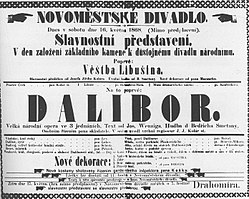Dalibor
| Work data | |
|---|---|
| Title: | Dalibor |

Poster of the first performance in 1868 |
|
| Shape: | Opera in three acts |
| Original language: | Czech |
| Music: | Bedrich Smetana |
| Libretto : | Josef Wenzig |
| Premiere: | May 16, 1868 |
| Place of premiere: | Novoměstské divadlo Prague |
| Playing time: | about 2 hours |
| Place and time of the action: | The Prague Castle and its surroundings, 15th century |
| people | |
|
|
Dalibor is an opera in three acts by the Czech composer Bedřich Smetana . The libretto is by Josef Wenzig , the Czech version by Ervín Špindler . The libretto is based on the story of the Bohemian knight Dalibor von Kozojedy around 1498. The first performance of the opera took place under the direction of the composer on May 16, 1868 in the Novoměstské divadlo (New Town Theater) in Prague on the occasion of the laying of the foundation stone of the National Theater in Prague .
content
prehistory
When Dalibor has to watch his friend Zdeněk being shot by soldiers during the war, he decides to avenge his death and free his oppressed people.
first act
Dalibor is on trial for having committed murder. King Vladislav, his adviser Budivoj and his entourage move in; the hearing is opened. Milada's brother, the burgrave, was killed in one of Dalibor's retaliatory strikes. Milada appears as the plaintiff. At the trial, Dalibor threatens the king and confesses the act; he receives a life sentence. Impressed by Dalibor's heroic nature, Milada begs the king for mercy in vain. She remains desperately aware that she has fallen in love with Dalibor. The orphan Jitka, who has learned many good things from Dalibor, uses the moment to persuade Milada to join the fighters. Dalibor is to be liberated.
Second act
Jitka and Vítek, who leads the fighters, call the troops together. You are preparing a riot. Milada disguises himself as a young man and sneaks the trust of Beneš, Dalibor's prison guard. Budivoj warns the guard, but Milada manages to get to Dalibor and bring him the violin he asked for. Dalibor sees Zdeněk in a dream, but when Milada appears, he wakes up. She confesses her love for him - he understands it as a message from his murdered friend and the two lovers dream of a future in freedom that they can spend together.
Third act
Budivoj warns King Vladislav of the uprising that is threatening the country from Dalibor's people. Beneš is executed after he reports that he unintentionally and unknowingly helped freedom fighters. Vladislav's dream of peace breaks with reality. Budivoj persuades the king to have Dalibor executed. Milada wants to prevent this and is mortally wounded in the process. Dalibor takes his own life next to the corpse of the beloved.
orchestra
The orchestral line-up for the opera includes the following instruments:
- Woodwind : two flutes , two oboes , two clarinets , two bassoons
- Brass : four horns , two trumpets , three trombones
- Timpani , triangle
- Strings
Work history
Smetana composed the opera for the laying of the foundation stone of the Czech National Theater. The start of construction of the theater revealed the demand for national independence of the Czechs, who were then ruled by the Viennese imperial family. The general mood had a positive effect on the premiere , but the opera was no longer popular at the second performance. The introduction of the leitmotif has been criticized; Smetana was accused of “Germanizing” music.
After the crackdown on the Prague Spring in 1968, the Prague National Theater put the then rarely performed opera Dalibor back on the repertoire . The parallels between the people's liberator Dalibor and Alexander Dubček were obvious. At that time Dubček's fate was still uncertain. Red Army troops suppressed the Hungarian uprising in 1956 ; Prime Minister Imre Nagy had been arrested by breaking his word and executed after a secret trial.
literature
- Robert Müller: Production of the opera “Dalibor” by Friedrich Smetana for the first German performance at the royal court in Munich . Weinberger Verlag, Munich 1891.
- Bedřich Smetana: Dalibor. Opera in three acts Weinberger Verlag, Leipzig 1900 (text by Josef Wenzig, set up for the German stage by Max Kalbeck ).
Web links
- Dalibor : Sheet music and audio files in the International Music Score Library Project
Individual evidence
- ↑ a b Ivan Vojtěc: Dalibor. In: Piper's Encyclopedia of Musical Theater . Volume 5: Works. Piccinni - Spontini. Piper, Munich / Zurich 1994, ISBN 3-492-02415-7 , pp. 724-727.
- ↑ Der Spiegel 47/1968 of November 18, 1968: Fortresses of Truth

